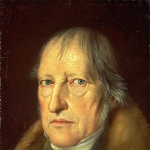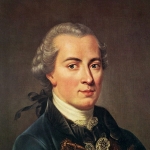Background
Jakob Fries was born on August 23, 1773, in Barby, Saxony-Anhalt, Germany.

Augustusplatz 10, 04109 Leipzig, Germany
In 1795 Fries went to Leipzig to study philosophy.
Fürstengraben 1, 07743 Jena, Germany
In 1797 Fries transferred to Jena to study with Fichte.
Jakob Fries was born on August 23, 1773, in Barby, Saxony-Anhalt, Germany.
Fries was educated in Niesky at the Moravian Academy of the United Brethren of Herrenhut. This upbringing had a lasting influence upon him, even though he early freed himself from the religious dogmas learned in his theological studies there. In 1795 Fries went to Leipzig to study philosophy and in 1797 he transferred to Jena to study with Fichte.
Having completed his course at Jena, Fries spent a year as a private tutor in Switzerland. At the same time he worked to finish his thesis, “De intuite intellectuali,” with which he qualified as docent at Jena in 1801.
In 1805 Fries was called to become an assistant professor of philosophy and elementary mathematics at Heidelberg. In 1816 he returned to Jena as full professor of theoretical philosophy. He was suspended because of political pressures following his participation in the Wartburgfest, a demonstration by liberal students in October 1817. Fries did not obtain permission to teach again at Jena until 1824, when he received a professorship of physics and mathematics. In 1825 he became professor of philosophy, a post he held for the rest of his life.
Fries considered himself Kant’s most loyal disciple. He believed that Kant had finished the philosopher’s task for all time and that only individual elements of his doctrine were susceptible to correction. Despite this belief Fries himself decisively altered the Kantian formulation by psychologizing Kant’s transcendental idealism in his major book, Neue oder anthropologische Kritik der Vernunft, published in 1807. He was opposed to all contemporary speculative systems and considered the Romantic interpretation of nature good only for aesthetics. In opposition to Schelling and his school, he went back to the attitude of critical Kantianism that held Naturphilosophie to be the philosophy of exact sciences.
Fries also spoke for contemporary positive scientific research, for which he gained authority from his works on physiological optics and the theory of probabilities, as well as from his textbook on experimental physics. With Kant he asserted the possibility of an a priori natural science, designed to show how the categories are applicable to experience as determinations of time through universal mathematical schema and how a system of universal laws of nature arises from this union. This system encompasses the theory of pure motion, which unites Newton’s mathematical approach with Kantian philosophy.
Fries’s system almost yields the philosophy of applied mathematics, although there remains the field of derivable statements a priori. Among them Fries considers the Newtonian axioms to be foremost. On the other hand, attraction and its lawfulness cannot be deduced a priori. While Fries took over Kant’s classification of natural knowledge into the four disciplines of phoronomy, dynamics, mechanics, and phenomenology, he added two new ones that he designated stochiology and morphology. Stochiology treats dynamics from a comprehensive viewpoint and attempts to establish a dynamic explanation of heat and light, as well as electrical and chemical phenomena.
Whereas Fries, like Kant, explained matter dynamically - and indeed he was much more sharply opposed to the atomists than was Kant - he deviated from him considerably with regard to dynamics itself. This is illustrated particularly by his rejection of apriorism in the concrete determination of the degree of force with which masses act upon each other. In further opposition to Kant, Fries posited four types of fundamental force in the constitution of matter: attractive and repulsive forces acting at a distance as well as attractive and repulsive contact forces.
Fries took a final important step beyond Kant in the introduction of the organic into his system of nature through the supposition of natural instincts. This doctrine of the instincts stated that along with the determination of the forms of interaction, the law of the counteraction of the fundamental forces must also be considered. According to Fries, the succession of appearances is caused by such instincts, which display complete forms of reciprocal action. They alone, rather than particular materials and forces, provide the explanation of physical phenomena and processes.
Fries’s doctrine of nature can be understood only in connection with romantic Naturphilosphie, in which the idea of polarity and the importance of magnetism and galvanism were employed to account for far more than just physical events. Fries’s doctrine of nature, however, employed the natural science available at the time in a serious attempt to overcome Kant’s vitalism, which even a Newton of the grass-blades would not accept. Indeed, his speculations in natural philosophy were actually fruitful for the development of modern biology through the work of his student Matthias Schleiden, who sought to put into practice the idea of the reduction of the organic to crystallization processes and thereby became the founder of modern cytology.
Jakob Fries was a preeminent post-Kantian philosopher. His most important treatise was the Neue oder anthropologische Kritik der Vernunft, in which he gave a new foundation of psychological analysis to the critical philosophy of Immanuel Kant. Among the most important works of his Jena professorate were the System der Metaphysik and Die Geschichte der Philosophie.
In politics Fries was a strong Liberal Unionist, and he did much to inspire the organization of the Burschenschaft. On the one hand, Fries was an advocate of enlightenment, civil and constitutional rights and the equality of man. On the other hand he propagated a cultural and religious conception of a homogeneous German nation excluding Jews as an ethnic and religious minority.
Fries was an adherent of post-Kantian philosophy. He tried to combine the teaching of Kant with elements from Friedrich Heinrich Jacobi's philosophy of faith, basing critical philosophy on psychology and substituting self-observation for the transcendental method. Fries maintained that only that which is sense-perceived can be known and that the principles of reason are immediately known in consciousness. Kant had sought to prove the principles of reason a priori. Fries, however, contended that human beings cannot know the supersensible, or things-in-themselves. They are objects of faith which satisfy the demands of the heart.


